City guides


Brisbane Travel Guide
Australia's third largest city has a relaxed, easy-going ambience that is well suited to its moniker: 'The City of Sundays'. As the capital of the state of Queensland, however, it has a serious side too, and despite it's laid-back aura it is filled with the cosmopolitan hustle and bustle of a major urban hub. Brisbane has several interesting districts, a good selection of street cafes, a wonderful riverside park, a very full cultural calendar, and a vibrant nightlife. Culture vultures should head for the South Bank, home to the Queensland Museum with its interactive displays; the Queensland Art Gallery with its magnificent collection; and the Performing Arts Centre, where international theatre companies and performing artists take to the stage.
There is plenty to keep shopaholics busy too, with the designer boutiques and department stores of Queens Street Mall ready to welcome visitors and numerous bustling markets dotted around the city. Sport fanatics, as always the case in Australia, are well catered for thanks to the Gabba sports ground and Suncorp Stadium, where the Wallabies often take on the world at rugby. The city is generally easy to explore on foot, and provides the perfect base from which to make daytrips to popular surrounding areas.
Situated on Australia's fabled Gold Coast, Brisbane provides easy access to Australia's east coast resorts and theme parks on the Pacific Motorway. A sub-tropical climate ensures that a holiday in Brisbane will be a sunny experience no matter what time of year is chosen. Most of the rain falls in summer, but not enough to deter holidaymakers. Most of those who travel to Brisbane come for leisure and pleasure. It is an ideal destination for a family holiday, a surfing holiday, or as a good base for anyone wanting to visit the nearby National Parks.
Things to do in Brisbane
The most popular tourist attractions in Brisbane include Sea World, the Lone Pine Koala Sanctuary, South Bank, and the Queensland Maritime Museum, located on the southern bank of the Brisbane River. The best views of the city can be earned by climbing the iconic Story Bridge on the Story Bridge Adventure Climb, or hiking up Mt Coottha for splendid panoramic views.
Visitors to Brisbane who are travelling with kids in tow will be pleased to know that besides being in one of the most naturally beautiful destinations in the world, Brisbane itself offers plenty of activities, both outdoors and in. Parents can take the kids to the Children's Art Centre at the Queensland Art Gallery and Gallery of Modern Art for a more cultural outing, while a trip to Sea World, Queensland's most popular attraction, is guaranteed to please with dolphins, penguins and even sharks to captivate and enthral children of all ages.
Travellers can pack a picnic, plenty of sunscreen and a Frisbee or ball and head to the New Farm Park where rolling green grass, fig trees and playgrounds offer options for exercise and relaxation. Animal lovers can't miss a visit to the Lone Pine Koala Sanctuary where visitors can interact with cuddly koalas and even get to hold or feed them. At the South Bank Parklands children can swim at the artificial beach, enjoy a ride on the Wheel of Brisbane, meet other kids in the playgrounds or even rollerblade and skateboard along the river's edge. Other great parks in Brisbane include Marchant Park and Peace Park, which both feature excellent playground areas.
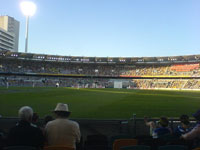
The Gabba
Named after the suburb of Woolloongabba in which it is located, and with a seating capacity of 42,000, the famous Gabba Cricket Ground is just a short bus ride from the city of Brisbane. Visitors can check out locals, the Queensland Bulls Cricket team or the Brisbane Lions Australian Rules football team, depending on when they choose to visit. Over the years The Gabba has hosted athletics, Australian Rules football, baseball, concerts, cricket, cycling, rugby league, rugby union, soccer and pony and greyhound races. Those lucky enough to catch an international cricket match are ensured a great day out. Sport is integral to Australian culture and even for those who are not themselves fanatical a visit to this passionately supported sports ground will be an exciting experience.
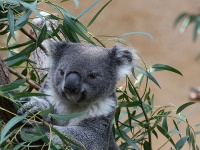
Lone Pine Koala Sanctuary
The world's oldest and largest koala sanctuary, the Lone Pine Koala Sanctuary is home to more than just the cute and cuddly koala, but also to kangaroos, Tasmanian devils, wombats, echidnas and various species of reptiles, as well as Australian parrots, cockatoos, kookaburras and cassowaries. Visitors can handle the koalas here (for a fee), making this one of only a few sanctuaries in the world where this is possible. Feeding and petting is also permitted and is carefully monitored, so this an ideal activity for families travelling with small children.
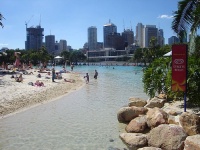
South Bank
The South Bank is a central Brisbane district packed with world-class attractions and experiences for visitors. It attracts nearly 10 million people each year, mostly to the South Bank Parklands, which were established on the former site of World Expo 88. The Parklands contain Australia's only man-made beach and lagoon, right in the heart of the city, known as South Bank Beach. There are also rainforest walks, picnic and barbecue areas and water features. One of Brisbane's most popular tourist attractions, South Bank is also home to the Queensland Cultural Centre, which includes Queensland Museum, Queensland Art Gallery, the State Library of Queensland, the Greater Union Hoyt's South Bank Cinemas and the Queensland Performing Arts Centre, which all line the Brisbane River proudly.
Shoppers and fashion lovers will enjoy Little Stanley Street, where all the latest in fashion can be picked up from the boutiques and retails stores lining the strip. The South Bank Art and Craft Markets take place every Friday night, as well as every Saturday and Sunday during the day. Visitors should head to the South Bank Visitors Centre which provides information on current events, including cultural activities, accommodation options, event information and details regarding restaurant and bar facilities.
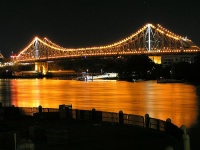
Story Bridge
One of the oldest bridges in Australia, the Story Bridge is a 3,517-foot (1,072m) long cantilevered bridge that spans the Brisbane River, connecting Fortitude Valley to Kangaroo Point. Brave visitors who are certain they don't suffer from vertigo can climb to the top of the bridge and be rewarded with breathtaking views over Brisbane's cityscape. One of only a handful of bridge climbs in the world, the Story Bridge is well worth a visit for those travelling through Brisbane. Advance bookings are recommended and money can sometimes be saved by booking online. Special deals are available for groups and there is even an abseiling option.
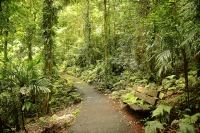
Gondwana Rainforests of Australia
Formerly known as the Central Eastern Rainforest Reserves, the Gondwana Rainforests were renamed after a southern supercontinent that existed approximately 550 milion years ago. Fossil records show that Gondwana was covered by the same kind of rainforests as the latter-day attraction.
The reserve includes 50 national parks that include Lamington National Park, Mount Chinghee National Park, Springbrook National Park, Mount Barney National Park and Main Range National Park, among many others that lie on the New South Wales side of Queensland. There are very few places on earth that contain so many plants and animals that remain fairly unchanged from their fossil records. The rainforests are remarkable and hugely rewarding for hikers and nature-lovers. Unsurprisingly, the forests have been UNESCO-listed.
There are a number of entry-points to the rainforest and, despite the pristine nature of the region, there is sufficient infrastructure to enable in-depth exploration of the forest, with well-maintained access-roads and walking trails, a number of adventure tour operators offering activities, and various accommodation options.
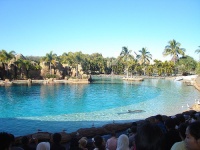
Sea World
One of Queensland's most popular attractions for visitors of all ages and an absolute must while on holiday with the kids in Brisbane, Sea World offers marine attractions, rides, shows and much more. Visitors can check out the ocean's most fearsome predator at Shark Bay, get up close and personal with Australia's only polar bears at Polar Bear Shores or see the Fairy penguins in their penguin suits, before taking a stroll through the Sea World Aquarium to discover Australia's exotic marine life. The adventurous can climb aboard the Jet Rescue rollercoaster ride, which is an exhilarating ride for kids of all ages.
Getting Around
There are three main types of public transport in Brisbane: buses, trains and ferries (CityCats), all operated by TransLink. Bus routes may be somewhat complicated for visitors, but they do cover most of the city. Buses need to be flagged down and will not automatically stop at bus stops. Two free bus routes that cover a number of popular tourist attractions are available in Brisbane: the City Loop operates around the CBD between red signposted bus stops, using distinctive red buses; and the Spring Hill Loop operates between the CBD and Spring Hill between yellow signposted bus stops, using distinctive yellow buses. Trains are quick and efficient, covering most of the city and suburbs. The ferry system, which serves points along the Brisbane River, is very popular with visitors. Ticketing for all forms of transport is cheap, and works on a zoning system. A variety of passes are available. Cycling is a popular option, and the city has many dedicated cycle-paths. Trains, buses and ferries are equipped to carry bicycles. Taxis can be found in ranks in the city centre and near most major hotels. Taxis may be pre-booked or hailed on the street. Driving a car in the city centre can be confusing because it consists mainly of a grid of one-way streets. There are parkades available downtown.
Brisbane Climate and Weather
Brisbane enjoys a subtropical climate with very high humidity and temperatures in the summer months, between December and February, and dry, mild winters, between June and August. Summers in Brisbane are often plagued with thunderstorms, heavy hailstorms, cyclonic winds and drought, but generally the warm, sunny weather is well suited to the holidaymakers who visit for leisure and pleasure all year round. The rainy season runs from November to March. Temperatures average between 67F (19C) and 84F (29C) in the peak summer months, but it is only marginally cooler the rest of the year, with the exception of the winter months, when temperatures average between 49F (9C) and 71F (22C).
Australia travel info
Electricity
Electrical current is 230 volts, 50Hz. Three-pin flat blade plugs are used but are different to those in most other countries, so an adapter is normally required.
Language
English is the official language of Australia.
Money
The unit of currency is the Australian dollar (AUD), which is divided into 100 cents. Credit cards are widely accepted and ATMs are freely available throughout the country. Banks and bureaux de change exchange most foreign currencies. Banking hours are generally 9.30am to 4pm, Monday to Thursday, and 9.30am to 5pm on Friday, but some banks offer extended hours and some are open on Saturday mornings.
Tipping
Most service providers in Sydney don't expect a tip, so travellers shouldn't feel pressured into giving one. A tip of 10 percent is standard in restaurants, however, and passengers usually round up to the nearest dollar or more in taxis.
Health
A yellow fever vaccination certificate is required by travellers over one year of age arriving within six days of having stayed overnight or longer in an infected country. No other special immunisations or medications are required for most trips to Australia; however, insect repellents are strongly advised because of the risk of mosquito-borne illnesses. Another health risk is sunburn, and visitors are advised to take precautions. Medical services are excellent but can be expensive, so travellers should ensure that they have adequate insurance. Australia has a reciprocal health agreement with the United Kingdom providing for free hospital emergency medical treatment; proof of UK residence is required.
Safety
The crime rate in Australia is low; however, travellers should be aware that tourists could be targeted by petty criminals. Visitors should be vigilant about personal possessions and travel documents, particularly in popular tourist destinations such as along the Gold Coast. Tropical cyclones normally occur between November and April in some parts of Australia, particularly in Western Australia, Queensland and the Northern Territory. There is a serious risk of bush fires in summer (November to March), especially in Victoria, Tasmania, New South Wales and ACT. Also during the summer months, the shallow coastal waters of northern Australia and Queensland become infested with marine stingers, commonly known as box jellyfish, whose sting is highly dangerous and can be deadly. Visitors should pay attention to signs on beaches and follow the instructions of local lifeguards to avoid injury.
Local customs
Generally an informal attitude, in dress and behaviour, prevails in most social and business situations. Sport, particularly rugby and cricket, is almost a religion in Australia.
Doing business
Those doing business in Australia are sure to find that the friendly yet professional corporate atmosphere of the country will provide them with an exciting opportunity to develop their careers. The business culture of Australia is a bit of a hybrid breed, incorporating the trappings of British formality and conservatism, the egalitarian ethos of Scandinavian countries, and the dynamic, innovative approach to business that is generally thought of as American in origin - rounded out, of course, with typical Australian warmth and humour. The approach to management in Australia is consultative, pragmatic, and strictly non-hierarchical. Those in positions of relative power are accorded respect by virtue of their personal qualities, not simply because they happen to be the boss.
Business etiquette in Australia further reflects this egalitarian ethos. Business people should use titles initially, though they will almost certainly be told to dispense with them and refer to their colleagues by their first names. They should maintain eye contact when speaking to their associates, as this is regarded as a sign of forthrightness and trustworthiness, qualities that Australian business people tend to favour over showiness, self-aggrandisement or empty promises. Business meetings in Australia should be scheduled about a week in advance, and then confirmed a few days before they are due to take place.
Colleagues should be punctual, as lateness can be seen as a symptom of flakiness or indifference. Business meetings in Australia do not generally proceed from a set agenda. Rather, they are viewed as open forums, in which ideas are to be debated and discussed. In fact, over-preparing for a meeting can make participants seem pushy, as though they wish to bully others into adopting their opinions on the issue at hand. The dress code for business in Australia remains surprisingly traditional: dark suits and ties are the norm for men; for women, business suits, worn either with pants or a skirt. As a general rule, business people should avoid loud jewellery and accessories, as to Australian eyes they might make them seem arrogant. The official language of business in Australia is English, and business hours are generally from 8.30am (or 9am) to 5pm (or 5.30pm), Monday to Friday.
Duty free
Travellers to Australia over 18 years do not have to pay customs duty on 2.25 litres of alcohol; and 25 cigarettes or 25g of cigars or tobacco products. All tobacco products in travellers' baggage are included in this category, regardless of where they were purchased. Gifts are included in the A$900 duty-free allowance. Fresh produce and animal or plant products are prohibited.
Communications
The international dialling code for Australia is +61. Hotels, cafes and restaurants offering free WiFi are widely available; purchasing a local prepaid SIM card can be a cheaper option than paying international roaming costs, which can be quite high.
Passport & Visa
A valid passport and a visa or ETA is required for travel to Australia. An ETA is an electronically issued and verified visa, not visible in a passport. ETAs are issued to passengers travelling for touristic or business purposes. Tourist ETAs are usually valid for three months. ETAs are obtainable online at: www.eta.immi.gov.au or through most travel agents. It is highly recommended that passports are valid six months after departure from a holiday destination.
Entry requirements
US nationals must have a valid passport on arrival. A pre-obtained Electronic Travel Authority (ETA) is required for stays of up to three months.
UK nationals must have a passport valid for intended period of stay. A pre-arranged Electronic Travel Authority (ETA) is required for stays of up to three months.
Canadian nationals require a passport valid for intended period of stay. A pre-arranged Electronic Travel Authority (ETA) is required for stays of up to three months.
South African nationals must have a passport valid for at least six months after their date of departure. A visa is required.
Irish nationals must have a passport that is valid on arrival. A pre-arranged Electronic Travel Authority (ETA) is required for stays up to three months.
New Zealanders require a valid passport on entry to Australia. A Special Category Visa (SCV) is issued on arrival after completing a passenger card.
Useful contacts
Australian Tourist Commission, Sydney: +61 (0)2 9360 1111 or www.australia.com
Emergencies: 000 (112 on cellphones)Embassies / consulates in other countries
Embassy of Australia, Washington DC, United States: +1 202 797 3000.
Australian High Commission, London, United Kingdom: +44 (0)20 7379 4334.
Australian High Commission, Ottawa, Canada: +1 613 236 0841.
Australian High Commission, Pretoria, South Africa: +27 (0)12 423 6000.
Australian Embassy, Dublin, Ireland: +353 (0)1 664 5300.
Australian High Commission, Wellington, New Zealand: +64 (0)4 473 6411.
Embassies / consulates in Australia
Embassy of the United States, Canberra: +61 (0)2 6214 5600.
British High Commission, Canberra: +61 (0)2 6270 6666.
Canadian High Commission, Canberra: +61 (0)2 6270 4000.
South African High Commission, Canberra: +61 (0)2 6272 7300.
Embassy of Ireland, Canberra: +61 (0)2 6214 0000.
New Zealand High Commission, Canberra: +61 (0)2 6270 4211.


